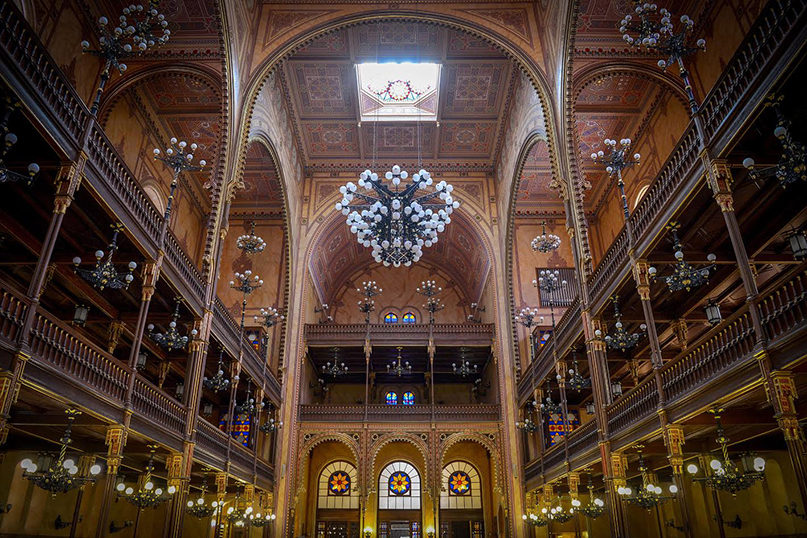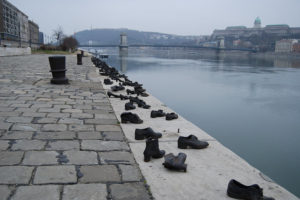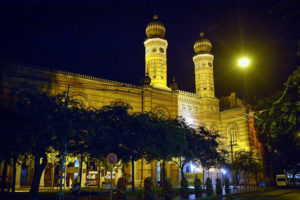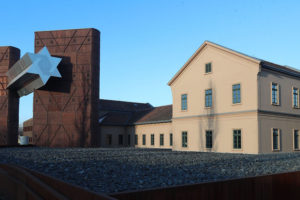
By Sean Savage
(JNS) The history of Europe and the Jewish people is one that has seen some of humanity’s most remarkable triumphs and darkest periods. Despite the Jewish population nearly being wiped out in the Holocaust, the story of Judaism and Europe is still being written today. The central European nation of Hungary, home to some 120,000 Jews out of a population of nearly 10 million, has historically played a large role in this story – one that it is still grappling with today due to its complex past, tense present and uncertain future.

“Shoes on the Danube” is a Holocaust memorial that depicts the shoes left behind by Hungarian Jews after they were shot by Arrow Cross militiamen in Budapest and their bodies fell into the river.
“When this government was first elected back in 2010, we had to obey the constitution. And in this constitution, we state that we are a Christian country, and we are very proud of that and our Judeo-Christian heritage, which is very strong in Hungary,” Hungarian Ambassador to the United States László Szabó told JNS.
Szabó, who has served at his post since 2017, said, “We believe that the Jewish Christian heritage that the European civilization is built upon is strong and alive in Hungary. We believe Jewish Christian culture and origin of European civilization is the strongest foundation and our country’s survival over the last millennia.”
Christianity has played a significant role in Hungary’s history and identity after being adopted in the 11th century, and most Hungarians today still identify as such, despite the Communist era and increasing secularization throughout Europe. Unlike elsewhere on the continent, Hungarian Prime Minister Viktor Orbán has been making the country’s Christian values and identity as a centerpiece of his government, even calling his country a “Christian democracy.”
“We believe this is something we need to preserve, and quite clearly, Israel is the torch in that battle,” said Szabó. “We think that going back to the roots and this very foundation is the secret of a very successful society, and that is what we are trying to build.”
The Judeo-Christian civilization that informs the right-wing government of Orbán has been a source of controversy throughout Europe. At a time when many Europeans have dropped their Christian roots, Orbán has embraced them, viewing himself as a defender of these values. These values seem to play a role in his embrace of Israel.
Last year, Orbán made a high-profile visit to the Jewish state and was welcomed by Israeli Prime Minister Benjamin Netanyahu as a “true friend of Israel.”
Earlier this year, Hungary became the first European country in decades to open a diplomatic trade mission in Jerusalem.
“This is a very exciting moment for us because it’s the first European diplomatic mission opened in Jerusalem in many decades, and three Hungarian diplomats are going to be assigned to this office for trade purposes,” said Netanyahu. “That’s important for trade, for diplomacy and for the move that Hungary is leading right now to change the attitude in Europe towards Jerusalem.”
Additionally, Budapest has defended Israel on the international stage.
“On the platform of the United Nations and European Union, we have strongly supported pro-Israel positions or vetoed anti-Israel initiatives,” said Szabó. “One of the most recent ones was when the European Council wanted to declare that it was a bad idea for the U.S. to move its embassy to Jerusalem. We were one of the first countries to veto it. Earlier this year, we decided to open our diplomatic mission in Jerusalem. We have not yet moved the embassy, but I believe this is a very important step that we are one of the first countries to open a diplomatic mission after the United States and Guatemala. We hope many other countries follow that path.”
Indeed, countries in Central and Eastern Europe, such as Hungary, Poland, the Czech Republic, Greece and Romania, have become strong allies of Israel, defending the country against anti-Israel resolutions in the European Union, such as the battle to re-label goods from Israeli settlements, or condemning the U.S. decision to move the embassy from Tel Aviv to Jerusalem.
Judaism’s millennia–old presence in Hungary

Israeli Prime Minister Benjamin Netanyahu holds a joint press conference with Hungarian Prime Minister Viktor Orbán in Jerusalem, July 19, 2018. (Marc Israel Sellem/POOL)
Hungary’s emergence as one of Israel’s staunchest defenders in Europe is a remarkable feat considering the complex history of Hungary and the Jewish people. Still, news coverage on Hungary of late seems to focus on negative moves by Orbán, who has been accused of eroding democratic institutions, using antisemitic tropes against political enemies and revising history, especially Hungarian complicity in the Holocaust. Yet given this, Hungary also has remarkably low levels of antisemitism and a thriving Jewish community that seems at odds with the accusations against the government.
While Jews first settled in the region during the Roman era, the modern community can be traced back to the medieval period during the formation of the Hungarian state. Like other European Jewish communities during the subsequent centuries, they enjoyed periods of prosperity and peace under various leaders, followed by persecution and even expulsions under others. Nevertheless, the community continued to grow, and by the eve of the 19th century numbered about 81,000 people.
In 1867, Hungarian Jews were fully emancipated and granted the same political and civil rights as their Christian compatriots in the Austro-Hungarian Empire, allowing them to play an active role in Hungarian commercial, financial and cultural life. In subsequent decades, Hungarian Jews made enormous contributions to culture, science, industry and even sports.
During the 1920s and ’30s, Hungarian Jews began to face the first series of antisemitic laws and discrimination as the situation in Europe began to destabilize. Nevertheless, on the eve of the Holocaust, the community numbered about 825,000 people. Despite facing severe persecution under dictator Adm. Milkos Horthy and feeling the ramifications of German power throughout World War II, Hungarian Jews were nearly spared the fate of their brethren until the last year of the war. It wasn’t until 1944 when the Nazis began to address Hungarian Jewry in full force, occupying the country in March, and rounding up local Jews in ghettos and deporting them to death camps, mainly Auschwitz, in what was described as one of the most horrifyingly efficient operations of the Holocaust even as the German war effort was starting to fail.
In the end, approximately 255,000 Hungarian Jews survived (Nobel laureate Elie Wiesel and former Californian Rep. Tom Lantos among the more well-known), less than one-third of its prewar population.
For the survivors of the Holocaust, the ensuing Communist-era did not offer any sanctuary. While some Jewish communities were reconstituted, there were also a series of pogroms in the post-war period as well as the closure of Jewish institutions and arrest of activists by the communists.
Going in the right direction’
In the 21st century, the Hungarian Jewish community has seen a remarkable comeback.
According to the World Jewish Congress, its population stands at about 120,000, making it one of the largest communities in Europe. Budapest, where most of the community lives, has a number of Jewish institutions, including museums, community centers and synagogues, such as the Dohány Street Synagogue, the largest in Europe. Budapest itself has more than 20 active synagogues that include the range of Jewish denominations from Orthodox to Reform, and a Chabad-Lubavitch presence. A number of Jewish organizations and youth groups are active in Hungary, and the country recently successfully hosted the European Maccabi Games in August.
Nevertheless, the modern Hungarian Jewish community faces challenges similar on the global scale, such as intermarriage, an aging population and growing antisemitism.
“Once you are in Budapest, you realize how much fake news is going around on Hungary. We are really unjustifiably blamed for being an antisemitic country,” said Szabó. “This might have been the case 70 years ago, but if you walk around Budapest today, you can see that Hungary is one of the best places for Jews in Europe.”

The Jewish cemetery and memorial for victims of the Holocaust at the Dohány Street Synagogue (the Great Synagogue), in Budapest, Hungary. (Nati Shohat/Flash90)
“Jews in Hungary are not considered minorities; they are considered Hungarian. It is just a feature of them that they follow the Jewish faith, and there is nothing special about them, unlike other Western countries. They feature prominently in Hungarian society and are great contributors to our culture,” said Szabó.
“Before the war, five percent to six percent of Hungarians were Jews, but 30 percent of medals were won by Jews,” he said. “We clearly see the contribution from sports to Nobel prizes. We are proud of that.”
The ambassador continued, “We are also proud that there is an interest by Jews in Hungary from all over the world. I am happy to say in 2016, Israel was second-largest investor in Hungary, including in real estate and industry. Obviously, you put your money where your mouth is, and I believe this is a good indication that something is going in the right direction.”
According to Hungarian Foreign Minister Péter Szijjártó, more than 200 Israeli companies employ 5,500 people in Hungary. Trade between the two nations stood at $525 million in 2018.
“We have approximately 100,000 people who claim themselves Jews, and in Hungary, there are no issues in practicing their religion. If you wear a kipah in Hungary, nobody cares,” said Szabó.
Much has been reported about the revival of antisemitism across Europe in recent years. While some has been attributed to the rise of far-right and far-left groups and parties, fingers have also pointed to the influx of Muslim migrants, particularly due to the Syrian civil war, and threat of Islamic terrorism.
This combination of Jew-hatred has become especially relevant in Western Europe, where far-left leaders like the British Labour Party leader Jeremy Corbyn have cloaked antisemitic views with anti-Zionism, leading to scandal in his party and fears of him becoming prime minister amid the Brexit crisis. France, with a large Muslim community from North Africa that has historically rejected nationalist inclusion, has seen brutal Islamic terror attacks on the Jewish community, causing Jews to fear for its future and even sparking emigration. Similarly, Germany, which has absorbed a massive influx of Muslim migrants, has reported an almost 20 percent rise in antisemitism.
Far-left groups across Western Europe are also fueling the BDS movement that targets Israel. This movement is particularly forceful in Ireland – one of Europe’s fiercest critics of Israel and the first E.U. country to vote to boycott goods from Israeli settlements. Similarly, many towns and cities across Spain have moved to boycott Israel and its goods.
Eastern European countries like Hungary have largely closed their borders to outsiders, and have refused to take in the waves of refugees from the Middle East and Africa. Hungary has refused E.U.-mandate deals for the allocation of refugees; opinion polls show the vast majority oppose accepting refugees. As a result, Eastern Europe remains largely homogenous as compared to Western Europe.
Hungary made headlines during the migrant crisis in 2015-16, when more than a million people crossed into Europe for its refusal to absorb migrants, who hailed mainly from Muslim countries across the Middle East like Syria, to the erection of a $476 million, 100-mile border fence along its frontier with Serbia, which is not a member of the E.U., to stem the flow. Hungary built a barrier along its border with Croatia as well. Leaders in Hungary have hailed the Serbian-border fence for protecting “European culture and European values.”
Szabó believes that the Hungarian government’s strong stance on the migrant crisis is tied to his country’s positive situation for its Jewish community.
“Even though in Hungary we are not perfect, we are headed in the right direction. We believe that the irresponsible immigration policies that many countries decided to support is creating this new type of antisemitism. The huge crowds coming to Europe come from antisemitic countries; this is something that the governments are shy to talk about. We have to make sure that the policies and requirements of the E.U. have to be kept.”
Indeed, surveys have shown that Hungarian Jews feel both safer and face less antisemitic attacks than their counterparts in Western Europe. A 2018 survey by the American Joint Distribution Committee’s International Center for Community Development found that Eastern European Jews (including Hungary) reported higher feelings of safety (96 percent) than their Western European Jewish neighbors (76 percent).
“Western European respondents were more likely to consider antisemitism as a threat than were Eastern Europeans, and to report deterioration in the situation from earlier surveys,” the report said.
Additionally, Hungary’s antisemitic watchdog group, TEV, reported 32 antisemitic hate crimes in 2018, the lowest since it started tracking in 2014. For comparison, the United Kingdom, which has about three times the Jewish population of Hungary, recorded 1,652 antisemitic incidents in 2018, the highest total since it began collecting data in 1984.

The Dohány Street Synagogue – aka the Great Synagogue – in Budapest, Hungary. It is the largest synagogue in Europe and the second-largest in the world. (Yossi Zeliger/Flash90)
Szabo attributes Hungary’s low number of antisemitic hate crimes to “the prime minister’s zero tolerance for antisemitism since he was elected in 2011. Since then you can see the numbers, but Hungary has probably become one of the safest countries for Jews in Europe.”
“We are very proud of that. We believe that this is not only our moral duty, but also a competitive edge when it comes to politics, the economy, and culture. We believe this is something we can build on,” he said.
While Hungary may not be facing the threat of Islamic terrorism and antisemitism that has taken hold in Western European, Eastern European countries have been concerned over the rise of right-wing nationalism, populism and historical revisionism.
In Poland, the issue of Holocaust revisionism led to tensions with Israel last year after the country passed a law to criminalize associating Poland with crimes committed by the Nazis during World War II. After a global outcry, Poland reversed itself on the law.
Hungary has faced its own controversy regarding the Holocaust under Orbán with his praise of wartime leader Horthy as an “exceptional statesman,” as well as the concern over historical revisionism with its long-delayed “House of Fates” Holocaust museum commissioned by Orbán back in 2013.
“There is a strong trend in Hungary today to present the destruction of Hungarian Jewry during the Holocaust as an exclusively German crime and, except for a small group of Hungarian thugs, to ignore the role and responsibility of the Hungarian authorities and society,” wrote the director of Yad Vashem Libraries, Dr. Robert Rozett, in a statement on the museum.
Szabó dismissed the House of Fates issue, saying it is a “controversy created by the left liberal press,” and that the country already has a world-class Holocaust museum, established in 1999 by the government during Orbán’s first term as prime minister.
“This current government wanted to have a new approach to it [the Holocaust] and the government provided space and money for the museum. This is where the controversy started. Some accused Orbán of wanting to change the past and to whitewash history; obviously, these accusations are completely unfounded,” said Szabó. After years of debate and criticism, the prime minister said, ‘OK, you tell us what should be in that museum.’ We contacted Yad Vashem and many Jewish organizations, and asked them for their input.”
At the same time, Orbán and his Fidesz Party have been also accused of using antisemitic tropes against left-wing billionaire and philanthropist George Soros, who is Jewish and was born in Hungary, during Orban’s 2018 re-election campaign. Soros runs the Open Society Foundation, which has funded many left-wing organizations, including ones that are “highly critical of the Jewish state, some of whom deny its right to exist.”
“I believe the whole thing is being orchestrated by George Soros. He has a lot of money, and the Open Society Foundation is funding a lot of organizations,” said Szabo. “I think that because Hungary has a strong and solid conservative government, that it creates enemies all around the world. And especially in the liberal media, there are a lot of accusations. They don’t base their judgment on fact, and it makes it very hard to fight it.”
“When it comes to George Soros, he is a speculator. He tried to ruin the British pound, the Swedish krona. He is an enemy of the people, and he is trying to destabilize many countries in Europe. He pulled out the Jewish card, nobody cares if he is Jewish or not, he is a speculator who went against Hungary and we have defended ourselves.”
The track record for the Hungarian government on fighting antisemitism paints a different picture.
Orbán has been involved in establishing a national Holocaust Memorial Day and recently pledged $3.4 million to fight antisemitism in Europe, and is staunchly defended by some Hungarian Jewish leaders as not harboring antisemitism.
“We also have mandated that all primary schools’ curriculums have Holocaust lessons,” said Szabó. “All primary-school kids go through the Holocaust lessons. Hundreds of teachers have traveled to Israel to learn about the Holocaust. We believe we are on the forefront of this, and we have nothing to be shy about.”
The ambassador said the world should talk to Jews in Hungary and see this for themselves. “They are the best references for us,” he said. “If you look at their incredible culture and celebrations of Jewish life, the beautiful synagogues – we have some of the largest in the world – and even Jewish cemeteries being renovated. We are very proud of this.”
“Sometimes, we feel isolated from the rest of Europe and singled out by the media. But I believe the more you know about Hungary, the more you like.”
Main Photo: Budapest’s Dohány Street Synagogue (Photo by Yossi Zeliger/Flash90)
Hungary’s Holocaust museum will address complicity, Jewish managers say
By Cnaan Liphshiz
(JTA) – Hungary’s Holocaust museum will deal with the complicity in the genocide of that country’s pro-Nazi rulers, the managers of the controversial institution said.
In June, a delegation from EMIH, a Chabad-affiliated Hungarian organization, unveiled for the first time their vision for and some content from Budapest’s House of Fates museum to the International Holocaust Remembrance Alliance, or IHRA.

The House of Fates Holocaust museum, housed in a former railway station that deported Jews to concentration camps, seen in Budapest, Jan. 21, 2019. It has not opened to the public despite having been finished five years ago. (Ferenc Isza/AFP/Getty Images)
A copy of the presentation, seen by the Jewish Telegraphic Agency, suggests the museum will deal with Hungary’s collaboration with Nazi Germany during the Holocaust – a major point of contention that has kept the museum closed for years past its scheduled opening date.
The museum will treat “popular support of Fascist movements” in Hungary and Europe “as a response to a perceived Communist threat,” reads the document for the presentation in Luxembourg, with is the rotating head of IHRA.
The museum, an 80,000 square-foot space featuring a recreated forced labor camp, will “take care to avoid trivializing and politicizing difficult questions of morality and responsibility when dealing with topics such as action and inaction, complicity and defiance,” EMIH wrote.
EMIH in September took over from the government managing the museum, which costs $20 million to construct.
The government put EMIH in charge following a boycott on the museum before it even opened by several Jewish groups and Yad Vashem, Israel’s state museum on the Holocaust, amid speculation that it would whitewash Hungarian complicity.
Expectations for House of Fates’ opening vary from six months to two years, according to the document.
“Hungary, as one of our 33 member countries, has committed itself to upholding the terrible truth of the Holocaust against those who deny or distort it. We commend the decision of the Hungarian Government to establish an international advisory board for the House of Fates initiative, with the inclusion of IHRA experts,” IHRA Chair Georges Santer wrote in a statement. “We look forward to supporting Hungary in their efforts to present a nuanced and self-critical history of the Holocaust in Hungary.”







 Southern New England Jewish Ledger
Southern New England Jewish Ledger













